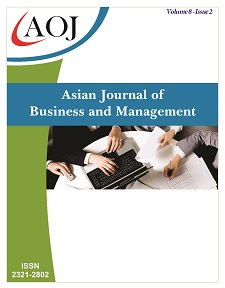The Effective Resource Budgeting as a Tool for Project Management
DOI:
https://doi.org/10.24203/ajbm.v8i2.6190Keywords:
Resource Budgeting, Budgeting, Resource Management, Tools, ProjectAbstract
In our globalizing world the competition among firms producing the same goods and services have intensified, every organization now seeks to maximize funds and resources while delivering the best results for projects embarked on towards the overall profitability of said organization. Consequently, understanding the relationship between effective resource budgeting and project management is a necessity. The main purpose of this study was to determine if there is a significant relationship between effective resource budgeting and project management. In this research paper, a literature review in the field of resource budgeting and project management was presented, and the papers were discussed for a deeper understanding of state of the art. This research made use of quantitative method to gather data due to the nature of the topic. Survey was used as a method of data collection. It was concluded that resource budgeting is a tool for project management, hence effective resource budgeting goes a long way in ensuring the success of a project. It was recommended that a more comprehensive research covering other states in Nigeria should be carried out so as to contribute to existing knowledge on project management.
Keywords: Resource Budgeting, Budgeting, Resource Management, Tools, Project Management
References
Antoson, G. 2004. Uncertainty Resource Management- Myths and Realities. Euram. Rotterdam.
Ford, R. 2002. Project Management: Planning and Control Techniques, Chichester, Wiley.
Green, A. H. 2006. An investigation into the concept of resource budgeting Virginia polytechnic institute and State University.
Herroelen, W. 2005. Project Scheduling—Theory and Practice. Production and Operations Management, 14, 413-432.
Ismail, A., Rashid, K. A. & Hilo, W. J. 2009. The use of Project Management Software in Construction Industry. Journal of Applied Sciences, 9, 1985-1989.
Johansen, A. E. 2006a. Uncertainty Management in Projects – A New Perspective. Annual journal of International Project Management Association (IPMA).
Kerzner, H. 2009. Project Management : A Systems Approach to Planning, Scheduling, and Controlling (10th Edition), Hoboken, NJ, USA, John Wiley & Sons.
Lovett, J. & Stauffer, L. Identifying Practices that Reduce Construction Project Durations. 30th annual National Conference of the American Society for Engineering Management 2009, ASEM 2009, 2009. 19-28
Mantel, S. J. 2001. Project management in practice, New York, Wiley.
Morris, N., Ugwu, O. & Doran, T. 2005. Causes of delay and cost overruns in construction projects. International Journal of Project Management, 12, 254-260.
PMI 2013. A Guide to the Project Management Body of Knowledge: (PMBOK guide), Atlanta, project management institute.
Westland, J. 2006. The Project Management Life Cycle: A Complete Step-By-Step Methodology For Initiating, Planning, Executing & Closing A Project Successfully, London, Kogan Page
Zidane, Y. 2012. Project Change in Large Scale Engineering Projects. master, Norwegian University of Science and Technology.
Zwikael, O., Pathak, R. D., Singh, G. & Ahmed, S. 2014. The Moderating Effect of Risk on the Relationship Between Planning and Success. International Journal of Project Management, 32, 435-441.
Downloads
Published
Issue
Section
License
Copyright (c) 2020 Asian Journal of Business and Management

This work is licensed under a Creative Commons Attribution-NoDerivatives 4.0 International License.
- Papers must be submitted on the understanding that they have not been published elsewhere (except in the form of an abstract or as part of a published lecture, review, or thesis) and are not currently under consideration by another journal published by any other publisher.
- It is also the authors responsibility to ensure that the articles emanating from a particular source are submitted with the necessary approval.
- The authors warrant that the paper is original and that he/she is the author of the paper, except for material that is clearly identified as to its original source, with permission notices from the copyright owners where required.
- The authors ensure that all the references carefully and they are accurate in the text as well as in the list of references (and vice versa).
- Authors retain copyright and grant the journal right of first publication with the work simultaneously licensed under a Creative Commons Attribution License that allows others to share the work with an acknowledgement of the work's authorship and initial publication in this journal.
- Authors are able to enter into separate, additional contractual arrangements for the non-exclusive distribution of the journal's published version of the work (e.g., post it to an institutional repository or publish it in a book), with an acknowledgement of its initial publication in this journal.
- Authors are permitted and encouraged to post their work online (e.g., in institutional repositories or on their website) prior to and during the submission process, as it can lead to productive exchanges, as well as earlier and greater citation of published work (See The Effect of Open Access).
- The journal/publisher is not responsible for subsequent uses of the work. It is the author's responsibility to bring an infringement action if so desired by the author.


